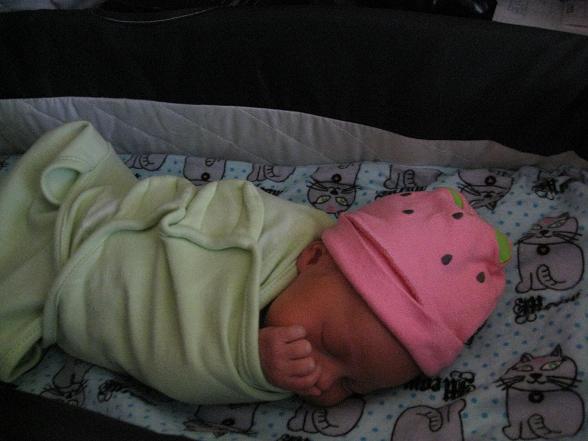Foreword: this is an emotional post, one of those that I wrote more for my own sake than for you to read. It’s rambling and disjointed and running a touch long, so I won’t be offended if you skip over it and wait for something on math or hybrids or finance. I also need to mention up front that Blueberry is home with us and doing great.
I’m just all tears and raw nerves.
I keep seeing that blue, unmoving body and thinking “babies don’t come back from that. You don’t get this perfect pink smiling child from that.” I’m afraid it’s a dream, or a mistake, and they’ll whisk her off to some other room at any moment.
The educated part of me does know that it was a very brief period with a 0 APGAR score, and that babies are very resilient: if there even was any brain damage, she’ll heal up, adjust, compensate, and probably end up being smarter and better adjusted than me.
I used to think that the scariest two words in the English language were “Scottish cuisine”, but now I know for a fact they’re “code pink”.
It’s kind of weird because at the time I was just in the moment, and I knew I had to keep cool and let the medical team do their thing. I had to be ready to deal with whatever came next, to support Wayfare, or help make decisions for baby’s care. Then I was just overwhelmed with joy when she started breathing on her own, and even in the incubator it was so magical to reach in and touch her arm and see her look at me.
It wasn’t until about 20 hours later that I was able to hold her in my arms outside the incubator. Just after that it kind of hit me like a brick wall and I just broke down crying:
We were back in the ward. Wayfare had a shared room, and in the rooms are these little cradles because they want the mothers to spend as much time as possible with the newborns. The other mother had her new baby in the room, and I sat down and stared at our empty cradle and cried because our baby was in the NICU and not with her mother. Weird, since by that point I knew it had turned out ok and even though she was still being watched in the NICU, she was in fine health… but it wasn’t until everything was kind of stable and settled that I the emotional roller-coaster ride caught up to me and I had my little traumatic breakdown.

I’m still a mess of emotions. Every now and then I flash back and hear in my head “code pink” over the intercom and the NICU pediatrican calling out “one-and-two-and-three-and-four” and just start crying and worrying about how close we came to losing her. Or the opposite, I’ll look at her perfect little face and start crying from the overwhelming joy.
One thing is for sure: nothing went according to plan.
Wayfare had a list prepared for labour: things to remember, and things to bring, and people to call for the big event. I saw it out and at the ready when I came home from the hospital from a nap and laughed and cried at how quickly that all went right out the window… For the last month of the pregnancy, Wayfare had unfortunately been experiencing a few complications: swelling and weight gain beyond what’s normal, and high blood pressure. These can indicate that the pregnancy is stressing the mother’s health, but they were slowly building up and weren’t so bad that it was an issue: just something to carefully monitor, and for her to live with until she delivered and they could resolve themselves. Last week though things started to escalate as she had traces of protein in her urine, which is indicative of stress on the kidneys. Then on Tuesday the traces became a fair bit of protein in the urine, and the urine production itself fell off a cliff: I think she said she only produced about 100 mL total that day, despite drinking plenty of fluids.
The midwives agreed it was time to consult an OB, go to the hospital, and get an induction (or potentially, a C-section) to move this pregnancy along.
An induction basically consists of two phases. The first is to get the cervix — which if you’re not up on your female sexual organ anatomy, can be thought of as the doorway the baby has to pass through to get out of the womb — to open up. It starts almost completely closed, and will open to something like 10 cm before the baby will pass through. So a drug is given to encourage the cervix to “ripen” or thin and open up. Even when medically stimulated, this tends to be a slow process: opening 1 cm per hour is a pretty decent rate, and it can take longer than that if the body isn’t ready. The second phase of induction is to give a drug that mimics oxytocin, which causes the uterus to contract and push the baby out, and this isn’t given until the cervix is at least most of the way along to opening.
So after giving Wayfare the cervidil to start the first phase of the induction, I was sent home to get some sleep: it was going to be 12-24 hours before anything more was expected, and I needed my rest.
Even the induction didn’t go as planned… after less than an hour of sleep she called me in a panic to get back to the hospital. Even without the oxytocin/pitocin, she was into furious, almost tonic contractions: one building up just seconds after the previous had ended. Her cervix had dilated 6 cm in 30 minutes, and there wasn’t time to do an exam after 6 cm, so we don’t even know if she was fully dilated by the birth. Things moved extremely quickly then, with doctors and nurses materializing, Wayfare’s body pushing involuntarily, and then — very quickly, in one push and one cut of the surgeon’s blade — the birth. All-told labour was just over an hour.
Out came Blueberry. Though she had a strong heart rate when the monitor was last hooked up just a few minutes before, and was kicking up a storm through the contractions, she came out blue and still. I didn’t get to cut the cord; there wasn’t time to even ask. Clamp. Cut.
Resuscitation.
Being readers and planners and worriers, we had even decided in our birth plan what to do if there was an issue with baby, and she had to be separated from mommy: my job would be to follow baby, and Wayfare would be accompanied by her mom. But they wouldn’t let me follow her to the NICU, and it was several nail-biting hours before I could see her. Even more before Wayfare was able to be moved to a wheelchair to visit.
—
My cousin was the first on that side of the family to father a child of the next generation. Everyone wanted to fawn over him, but the mother was crazy protective: she wouldn’t let anyone in the same room without washing their hands, and holding or touching him was out of the question.
Before the birth, I was telling Wayfare that there was no way I was going to be like that. Kids heal fast and need some environmental exposure to build up their immune systems. I might even lean the other way and invite people to “come and lick the baby” to boost her immune system. Wayfare looked at me and said “asking people to lick the baby is kind of weird”. Ok, maybe not lick per se — though babies are delicious — but you know: I’d let people hold her and visit; she’d play in the dirt and climb trees; she’d get kisses from puppy dogs and eat Oreos off the floor if it had only been 3 seconds.
Now, I don’t know. I’m afraid I may be broken, and I’ll end up being the most over-protective dad in the universe.
—
After-thoughts: just like Wayfare, Blueberry does have a real name, but will be “Blueberry” here.
I wrote the bulk of this post sometime on Day 2, after cracking up emotionally when we got Blueberry back from the NICU, and I just needed to try to put myself back together. I think writing some of it out helped. It’s now Day 4, and I’m starting to worry and fret a little less (though as Wayfare will confirm, just a little less). I’ve now managed to spend more time with our little family together and happy than separated and terrified, more time marvelling at my adorable daughter in my arms than reaching through a port in the incubator, and that’s helped a lot. While I’m still sleep deprived, I’m not at the 1-hour-in-24 level, which has made me feel a bit more human.
Each night so far I’ve spent at least two hours just holding Blueberry while she sleeps: I can’t bear to put her in the crib when I could just hold her in one arm while I eat or watch TV or whatever. Plus she seems to like it. But things are finally starting to feel normal-ish again. New normal perhaps, since no matter how she got here, things are never going to be quite the same again with a baby. I’ll probably stop being so ridiculous soon, and put her in a crib like a normal person.



 Questrade: use QPass 356624159378948
Questrade: use QPass 356624159378948 Passiv is a tool that can connect to your Questrade account and make it easier to track and rebalance your portfolio, including the ability to make one-click trades.
Passiv is a tool that can connect to your Questrade account and make it easier to track and rebalance your portfolio, including the ability to make one-click trades.